

Highlights from the 2011 journalists engagement survey. What happens if I click the ThankThis button?
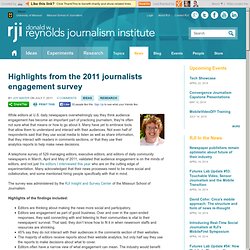
Nick Diakopoulos » News Commenting Systems. During my stay at the Sacramento Bee in 2009 I began studying the commenting system that the online paper was using, called Pluck.
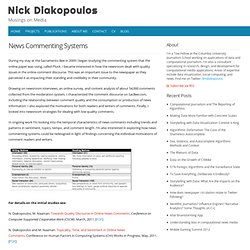
I became interested in how the newsroom dealt with quality issues in the online comment discourse. This was an important issue to the newspaper as they perceived it as impacting their standing and credibility in their community. Drawing on newsroom interviews, an online survey, and content analysis of about 54,000 comments collected from the moderation system, I characterized the comment discourse on SacBee.com, including the relationship between comment quality and the consumption or production of news information. I also explored the motivations for both readers and writers of comments. Finally, I looked into newsroom strategies for dealing with low quality comments. ‘Comments are content’ for local news sites: 8 tips to build community, coverage. What types of stories get comment traction on hyperlocal sites?
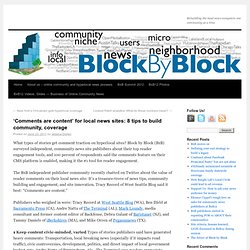
Block by Block (BxB) surveyed independent, community news site publishers about their top reader engagement tools, and 100 percent of respondents said the comments feature on their CMS platform is enabled, making it the #1 tool for reader engagement. A 5-minute framework for fostering better conversations in comments sections.
Last week, my news organization announced we were evolving our online commenting practices a bit to improve the quality of discourse on NPR.org.
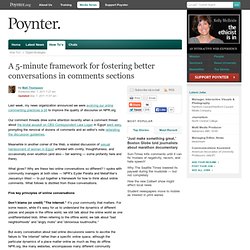
Our comment threads drew some attention recently when a comment thread about the brutal assault on CBS Correspondent Lara Logan in Egypt went awry, prompting the removal of dozens of comments and an editor’s note reiterating the discussion guidelines. Meanwhile in another corner of the Web, a related discussion of sexual harrassment of women in Egypt unfolded with civility, thoughtfulness, and occasionally even erudition (and also – fair warning — some profanity here and there). What gives? Why are these two online conversations so different? I spoke with community managers at both sites — NPR’s Eyder Peralta and MetaFilter’s Jessamyn West — to put together a framework for how to think about online comments.
Five key principles of online conversations Don’t blame (or credit) “The Internet.” For better outcomes, use better filters. Three kinds of engagement: outreach, conversation, collaboration. What happens if I click the ThankThis button?
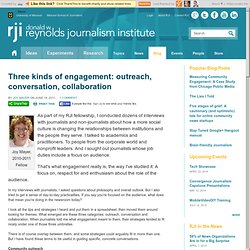
You are shown an exclusive local deal or a sponsored message, which rewards you and the content sharer with Patron Points, which you can donate to your favorite charities, and also pays the content creator. What is ThankThis? ThankThis is a new way to say “Thanks” online, one which benefits society and people's pocketbooks. It empowers netizens to turn (local) advertising dollars into funding for the charities and publishers they care about. How Should Journalists Use Social Media? @NickKristof's Fans' Advice - storify.com. Are Americans becoming more isolated from each other? Maybe, Pew says, but don’t blame Facebook. The accusations are familiar: The Internet is making us sad.
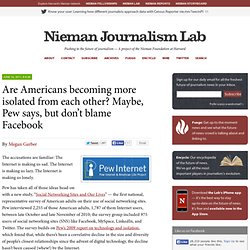
The Internet is making us lazy. The Internet is making us lonely. Community: A New Business Model for News. A few years ago, Public Radio International coaxed its most popular host, Ira Glass of "This American Life," into digital cinema.
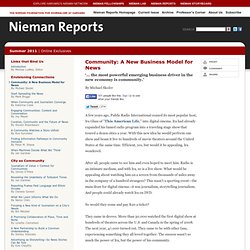
Ira had already expanded his famed radio program into a traveling stage show that toured a dozen cities a year. With this new idea he would perform one show and beam it live to hundreds of movie theaters around the United States at the same time. Rockville Central drops website for Facebook, offers eight lessons on Facebook news publishing. A little over 100 days ago, a community news blog in Rockville, Md., took a big leap.
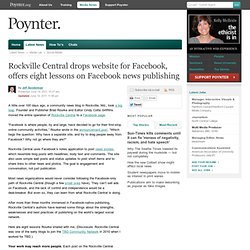
Founder and Publisher Brad Rourke and Editor Cindy Cotte Griffiths moved the entire operation of Rockville Central to a Facebook page. “Facebook is where people, by and large, have decided to go for their first-stop online community activities,” Rourke wrote in the announcement post. “Which begs the question: Why have a separate site, and try to drag people away from Facebook? Why not go where they are?” Rockville Central uses Facebook’s notes application to post news stories, which resemble blog posts with headlines, body text and comments. Most news organizations would never consider following the Facebook-only path of Rockville Central (though a few small ones have). Baltimore NewsTrust - Blog: Join the Truthsquad and fact-check O'Malley's claim about Maryland schools. This week, we're excited to kick off our first local Truthsquad on NewsTrust Baltimore.
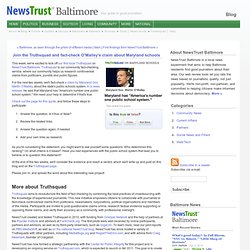
Truthsquad is our community fact-checking service, where our community helps us research controversial claims from politicians, pundits and public figures. For the next two weeks, we'll fact-check a claim by Maryland Gov. BBC College of Journalism Blog - #bbcsms: BBC processes for verifying social media content. The Future of Social Media in Journalism. This series is supported by Gist.
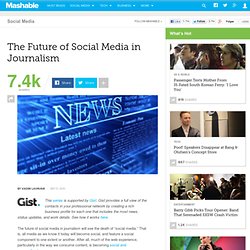
Gist provides a full view of the contacts in your professional network by creating a rich business profile for each one that includes the most news, status updates, and work details. See how it works here. The future of social media in journalism will see the death of “social media.” Facebook Instant. Facebook & Social Journalism by Vadim Lavrusik on Prezi. Journalists (1) Future of Media: Curation, Verification and News as a Process. 10,000 Words - Where Journalism and Technology Meet.